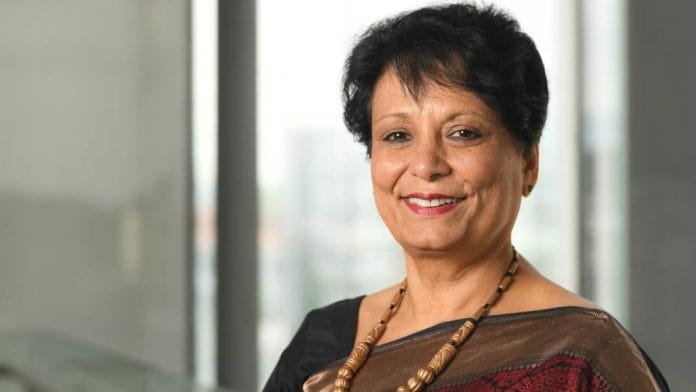New Delhi: India is an “excellent example” of vaccine manufacturing for lower income countries and is crucial in the fight against Covid-19, according to Anuradha Gupta, deputy CEO of Gavi, or the Global Alliance for Vaccines and Immunization.
“India will be a crucial part of the vaccine response to Covid-19 and is an excellent example of vaccine manufacturing for the Global South, by the Global South,” Gupta said.
The term “Global South” refers to countries classified by the World Bank as low or middle income ones that are located in Africa, Asia, Oceania, Latin America and the Caribbean.
Gupta also said the “scale and cost-effectiveness” of manufacturing vaccines in India will help her organisation ensure that no one is left behind in the access for Covid-19 vaccines.
“Thanks to the scale and cost-effectiveness of production that India provides, all the while ensuring the highest quality and safety standards, we are coming closer to our goal — that no country, rich or poor, is left at the back of the queue when it comes to Covid-19 vaccines,” Gupta said.
The Geneva-headquartered Gavi is a global private-public health partnership that aims to ensure improved access to new and underused vaccines, especially for children in the world’s poorest countries.
Also read: Covaxin a ‘buffet’ vaccine that can deal with mutations, others ‘a la carte’ — top virologist
‘Supply of Indian doses to low-income nations may start soon’
In the past, Gavi has worked with the Pune-based Serum Institute of India (SII) to make the pneumococcal conjugate vaccine (PCV) more affordable.
The SII, Gupta said, helped Gavi in cutting the price of that vaccine by 43 per cent.
“That cooperation has been extended to Covid-19 vaccines,” she said. “COVAX has an agreement with SII for 200 million doses with options for up to 900 million doses more of either the AstraZeneca or Novavax Covid-19 vaccine candidates,” she said.
COVAX is a programme launched in April by the World Health Organization (WHO), the European Commission and France with an objective of distributing vaccines to lower and middle income countries.
The effort is being coordinated by Gavi, the CEPI or Coalition for Epidemic Preparedness Innovations, and WHO.
According to Gupta, Gavi expects to start supplying these doses “in the first quarter of this year” to ensure the “timely and equitable access to vaccines”.
Also read: Investors sue AstraZeneca for vaccine testing stumble that caused its stock price to drop
Package for India
COVAX’s goal is to end the acute phase of the pandemic globally by delivering 2 billion doses of safe and effective vaccines, on a global, fair and equitable basis by the end of 2021.
For India, according to Gupta, Gavi and the Government of India have agreed on a tailored package under which the country will receive approximately 20 per cent of the total doses available to Advance Market Commitment (AMC)-eligible countries through the COVAX facility. She estimates that this will result in between 19 crore and 25 crore fully-subsidised doses for the country.
India will also receive 20 per cent of the total funding — available to AMC-eligible countries for urgent technical assistance and cold chain equipment — which will be around $30 million (Rs 210 crore), according to Gavi.
“This tailored support takes into account the country’s disease burden and related mortality, subnational inequities and a growing economic crisis on one hand, and the country’s population size and its role as a global vaccine supplier on the other,” Gupta said.
“While the majority of these doses will be delivered in the second half of the year, we anticipate being able to provide each participating economy with the first tranche – enough to protect approximately three per cent of the population – in the first half of 2021,” she added.
Also read: Vaccines trailing the front runners shift attention to battling Covid variants
‘Rich countries ready to cooperate’
The concerns related to non-equitable access of vaccines, where rich countries would inoculate their people while the poorer nations continue to wait for vaccine doses may prove wrong as leaders of rich countries know that elimination of Covid from everywhere is important for everyone to be safe, Gupta said.
“The fact that 190 countries have now signed up to the COVAX Facility — and that over US$ 6 billion has now been pledged to COVAX for ensuring procurement, readiness and delivery of vaccines to lower-income economies — shows that leaders of the wealthiest and poorest countries and territories alike understand that we will not be safe anywhere until we are safe everywhere,” she said.
“That COVAX is on track is thanks in no small part to the higher-income economies who have donated so generously to the COVAX Advance Market Commitment budget, and who may soon also be in a position to donate doses to COVAX,” she added. “It is also a powerful endorsement of the concept of multilateral cooperation, as it is only by working together that the world will be able to overcome this global crisis.”
Gupta said Gavi will begin delivering doses this quarter, with some countries receiving vaccines as early as February.
Also read: US, Europe still oppose India-SA plan to waive Covid vaccines’ IPR, WTO to discuss on 4 Feb






